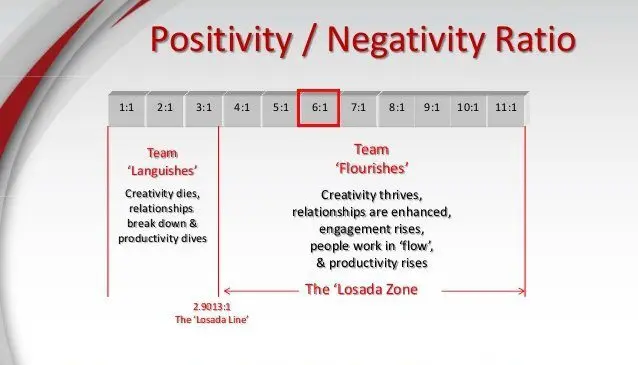If in communicating with a person for one reproach there are less than three praises, the relationship with him inevitably deteriorates – the Brazilian psychologist Marcel Lozada came to this conclusion. Martin Seligman, one of the founders of positive psychology, shares his thoughts on this topic.
It was Friday night, quarter past eleven. The work week was over, but I still could not get rid of the thought of the “minimum positivity coefficient”, which was the subject of a lecture by Barbara Fredrickson . And, I confess, during a family dinner, I thought and talked only about this.
“We’ve been to dozens of companies, writing down absolutely everything that’s said in meetings,” Barbara told us. – And we saw a clear pattern: if the ratio of positive to negative statements is higher than 2,9:1, the company is flourishing. If it is lower, things are not going well. We call this indicator the “Losada coefficient” in honor of the discoverer – the Brazilian colleague Marcel Losada. But don’t overdo it with positivity. Life is a ship that must have sails and a rudder. At a ratio above 13:1, positive sails flap aimlessly in the wind, and you lose your sense of reality … “
After the lecture, one student confessed to me: “Although Barbara talked about the work of companies, I only thought about my family. I suddenly realized that with my eldest son this ratio is 1:1, and I became terribly sad. I remembered our daily skirmishes. I wanted to grab my textbooks and go home faster. Barbara’s lecture made me think that you can start with sincere praise and only then move on to talking about his studies, driving style and other criticism … “
Positive emotions help to form permanent psychological resources that can be accessed in the future.
Unlike negative emotions that arise in emergency situations and allow us to deal with external stimuli, positive emotions help form permanent psychological resources that can be drawn on in the future. For example, in a fascinating conversation with a friend, communication skills are laid that we will use all our later lives. A child who likes to run develops coordination of movements, which will be useful to him in physical education classes. Positive emotions are more than pleasure. They show that development is underway, psychological capital is accumulating…
“Pa-a-ap! Will you take me to Alexis? Very necessary. Please, please!” my 14-year-old daughter Nikki interrupted these reflections. I often think of an old conversation with her. Nikki said that she had always been a crybaby, but on her fifth birthday she decided to change: “This is the most difficult thing I have done in my life. And if I can stop crying, then you can stop grumbling too!”
“Nikki, it’s almost midnight. Can’t you see I’m working? Go finish your homework or go to bed!” – I flared up … and caught my daughter’s eyes. “Dad,” she said, “you have a terrible Losada ratio.”










